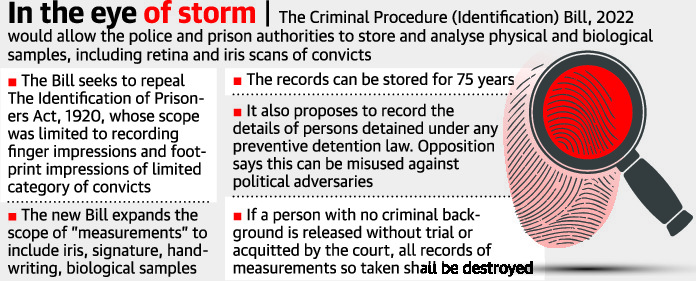ForumIAS announcing GS Foundation Program for UPSC CSE 2025-26 from 19 April. Click Here for more information.
ForumIAS Answer Writing Focus Group (AWFG) for Mains 2024 commencing from 24th June 2024. The Entrance Test for the program will be held on 28th April 2024 at 9 AM. To know more about the program visit: https://forumias.com/blog/awfg2024
What is Criminal Procedure (Identification) Act, 2022?

Objective: To allow the police and prison authorities to collect, store and analyze physical and biological samples, including retina and iris scans.
Repealing: The Act seeks to repeal the Identification of Prisoners Act 1920. The act applied to the collection of “measurements” for mostly those who were convicted and who would serve a prison sentence. Measurements under this Act involved only finger impressions and footprint impressions.
Scope of the Act: Compared to the 1920 Act, the Bill expands the individuals it seeks to cover. It proposes that the law applies to three categories of individuals:
– Those convicted of an offence are punishable under any law for the time being in force.
– Those ordered to give security for good behaviour or maintaining peace under Section 117 of the CrPC for a proceeding under Section 107, 108, 109 or 110 of the Code. These are provisions involving “suspected criminals” or “habitual offenders” with a view to preventing crime.
– Those arrested in connection with an offence punishable under any law in force or detained under any preventive detention law. This would include the National Security Act or the Public Safety Act.
Key Provisions of the Act
Powers to Police and Prison Authorities: It authorizes police and prison authorities to take measurements of convicts and other persons for the purposes of identification and investigation in criminal matters and to preserve records and for matters connected therewith.
Definition of Measurements: It defines “measurements” to include finger impressions, palm-print and foot-print impressions, photographs, iris and retina scan, physical, biological samples and their analysis.
Nodal Agency to Store Biological Data: The National Crime Records Bureau (NCRB) will be the repository of physical and biological samples, signatures and handwriting data that can be preserved for at least 75 years.
Empowers a Magistrate: A Magistrate can direct law enforcement officials to collect fingerprints, footprint impressions and photographs in the case of a specified category of convicted and non-convicted persons.
Refusal to Comply: Resistance to or refusal to allow the taking of measurements under this Act shall be deemed to be an offence under section 186 of the Indian Penal Code (IPC).
Exceptions: The Act states that except for those accused of offences committed against a woman or a child, or for any offence punishable with imprisonment for a period that is not less than seven years, a person accused of any other offence can refuse to allow the taking of his biological samples under the Act.
– Even if such data is collected from the accused, it can be destroyed from the records unless a magistrate in writing directs otherwise.
What are the issues with this Act?
Beyond Legislative competence of the Centre: The Act was beyond the legislative competence of Parliament, as it violated fundamental rights of citizens, including the right to privacy.
Lack of clarity: Several provisions are not defined in the Bill itself. For instance, the statement of objects says it provides for the collection of measurements for “convicts and other persons” but the expression “other persons” is not defined.
Against Article 20(3): The Act will be debated against Article 20(3) of the Constitution, which is a fundamental right that guarantees the right against self-incrimination. It states that no person accused of any offence shall be compelled to be a witness against himself.
Other Concerns: The Act brings to focus the rights of prisoners and the right to be forgotten since biometric data can be stored for 75 years. While the jurisprudence around the right to be forgotten is still in an early stage in India, the Puttaswamy judgment discusses it as a facet of the fundamental right to privacy.
Source: This post is based on an article “Protest in LS as Bill envisages lifting biometrics of detainees” published in The Hindu on 29th March 2022.




